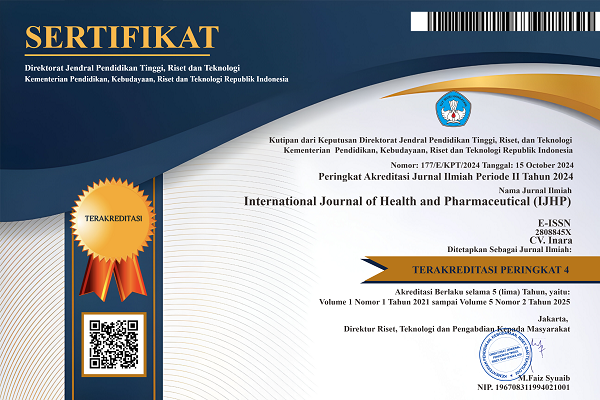Enhancing Adolescent Health Literacy Through A Community- Based Educational Intervention: A Pilot Study In A Rural Indonesian Setting
DOI:
https://doi.org/10.51601/ijhp.v5i3.419Abstract
Access to accurate and meaningful health information remains a major challenge for adolescents living in rural areas, which negatively affects their level of health literacy, particularly in relation to general physical health and mental well-being. To address this issue, this preliminary study was designed to examine the extent to which a brief community-based educational intervention could enhance the health literacy capacity of adolescents in rural Indonesia. A total of 33 adolescents aged between 11 and 18 participated in two structured educational sessions, which focused on topics such as nutrition, personal hygiene, emotional regulation, stigma reduction, and peer counseling techniques. Interactive learning activities—including group discussions, scenario-based case problem solving, and role-playing—were employed to strengthen participant engagement and contextualize the material to the local setting. Changes in participants' knowledge were evaluated using a structured questionnaire administered before and after the intervention, covering two main dimensions: general health literacy and mental health literacy. A paired t-test was applied to analyze differences between pretest and posttest scores. The findings revealed a significant improvement in general health literacy, with mean scores increasing from 79.9 (SD = 17.3) to 94.9 (SD = 7.9; p < 0.01). A more substantial improvement was observed in mental health literacy and peer counseling skills, with mean scores rising from 31.82 (SD = 24.43) to 81.82 (SD = 20.98; p < 0.001). Overall, the results indicate that participatory, short-term educational models that are aligned with local cultural values hold considerable promise for strengthening adolescents’ conceptual understanding and emotional engagement with health-related issues, particularly in areas with limited access to healthcare services.
Downloads
References
Arnold, E. R., Liddelow, C., Lim, A. S. X., & Vella, S. A. (2025). Mental health literacy interventions for female adolescents: A systematic review and meta-analysis. European Child & Adolescent Psychiatry. https://doi.org/10.1007/s00787-025-02648-2
Chansukree, P., Sagarik, D., & Cho, W. (2022). Public Employee Use of Social Media at Work: Competency, Collaboration, and Communication of Workplace Policy. Public Personnel Management, 51(3), 330–354. https://doi.org/10.1177/00910260221098737
González-Sanguino, C., Rodríguez-Medina, J., Redondo-Pacheco, J., Betegón, E., Valdivieso-León, L., & Irurtia, M. J. (2024). An exploratory cross-sectional study on Mental health literacy of Spanish adolescents. BMC Public Health, 24(1), 1469. https://doi.org/10.1186/s12889-024-18933-9
Kayalkar, V. D., & Dmello, M. K. (2024). Health literacy among rural adolescents in Amravati, Maharashtra: A Community based cross-sectional study. Clinical Epidemiology and Global Health, 26, 101532. https://doi.org/10.1016/j.cegh.2024.101532
Lindow, J. C., Hughes, J. L., South, C., Minhajuddin, A., Gutierrez, L., Bannister, E., Trivedi, M. H., & Byerly, M. J. (2020). The Youth Aware of Mental Health Intervention: Impact on Help Seeking, Mental Health Knowledge, and Stigma in U.S. Adolescents. Journal of Adolescent Health, 67(1), 101–107. https://doi.org/10.1016/j.jadohealth.2020.01.006
Mananohas, A., Rachmawati, T. S., & Anwar, R. K. (2023). Penggunaan media sosial dalam meningkatkan literasi kesehatan di “Ayah ASI Indonesia.” Informatio: Journal of Library and Information Science, 3(1), 1. https://doi.org/10.24198/inf.v3i1.44526
Mancone, S., Corrado, S., Tosti, B., Spica, G., Di Siena, F., Misiti, F., & Diotaiuti, P. (2024). Enhancing nutritional knowledge and self-regulation among adolescents: Efficacy of a multifaceted food literacy intervention. Frontiers in Psychology, 15, 1405414. https://doi.org/10.3389/fpsyg.2024.1405414
Manganello, J. A. (2007). Health literacy and adolescents: A framework and agenda for future research. Health Education Research, 23(5), 840–847. https://doi.org/10.1093/her/cym069
Nutbeam, D. (2000). Health literacy as a public health goal: A challenge for contemporary health education and communication strategies into the 21st century. Health Promotion International, 15(3), 259–267. https://doi.org/10.1093/heapro/15.3.259
Pribadi, T., Elliya, R., Furqoni, P. D., Ernita, C., Desmonika, C., Sari, E. N., & Erlianti, F. (2022). Penyuluhan kesehatan tentang kesehatan jiwa pada remaja. JOURNAL OF Public Health Concerns, 2(1), 1–9.
Putri, C. M. P. M., Aristi, D., Alkaff, R. N., & Desita, U. K. (2025). Literasi Kesehatan Mental dan Perilaku Diagnosis Diri pada Mahasiswa. Perilaku dan Promosi Kesehatan: Indonesian Journal of Health Promotion and Behavior, 6(2). https://doi.org/10.47034/ppk.v6i2.1090
Roiefah, A. L., Pertiwi, K. D., & Siswanto, Y. (2021). Hubungan Tingkat Literasi Kesehatan dengan Perilaku Pencegahan PTM PadaRemaja di Kabupaten Semarang.
Sørensen, K., Van Den Broucke, S., Fullam, J., Doyle, G., Pelikan, J., Slonska, Z., Brand, H., & (HLS-EU) Consortium Health Literacy Project European. (2012). Health literacy and public health: A systematic review and integration of definitions and models. BMC Public Health, 12(1), 80.
Townsend, & Mary. (2014). Essentials of Psychiatric Mental Health Nursing: Concepts of Care in Evidence-Based Practice. F.A. Davis Company.
Wardaningsih, S., Rizqi, M. A., Warastri, A., Nurmaguphita, D., Brawijaya, J., & Siliwangi, J. (2023). Pelatihan Peer Counselor Untuk Meningkatkan Efikasi Diri Dalam Memberikan Konseling. 3.
WHO. (2022). Coming of Age: Adolescent Health [Online post]. https://www.who.int/news-room/spotlight/coming-of-age-adolescent-health
Yang, X., Hu, J., Zhang, B., Ding, H., Hu, D., & Li, H. (2024). The relationship between mental health literacy and professional psychological help-seeking behavior among Chinese college students: Mediating roles of perceived social support and psychological help-seeking stigma. Frontiers in Psychology, 15, 1356435. https://doi.org/10.3389/fpsyg.2024.1356435
Yunieswati, W., Kushargina, R., & Rizqiya, F. (2022). Edukasi Gizi Berbasis Teknologi untuk Peningkatan Pengetahuan Gizi dan Antioksidan pada Remaja. Jurnal Kedokteran dan Kesehatan, 18(1), 69. https://doi.org/10.24853/jkk.18.1.69-77.
Downloads
Published
How to Cite
Issue
Section
License
Copyright (c) 2025 M. Bambang Edi Susyanto, Shanti Wardaningsih, Sarah Nur Hidayah

This work is licensed under a Creative Commons Attribution-NonCommercial 4.0 International License.



























